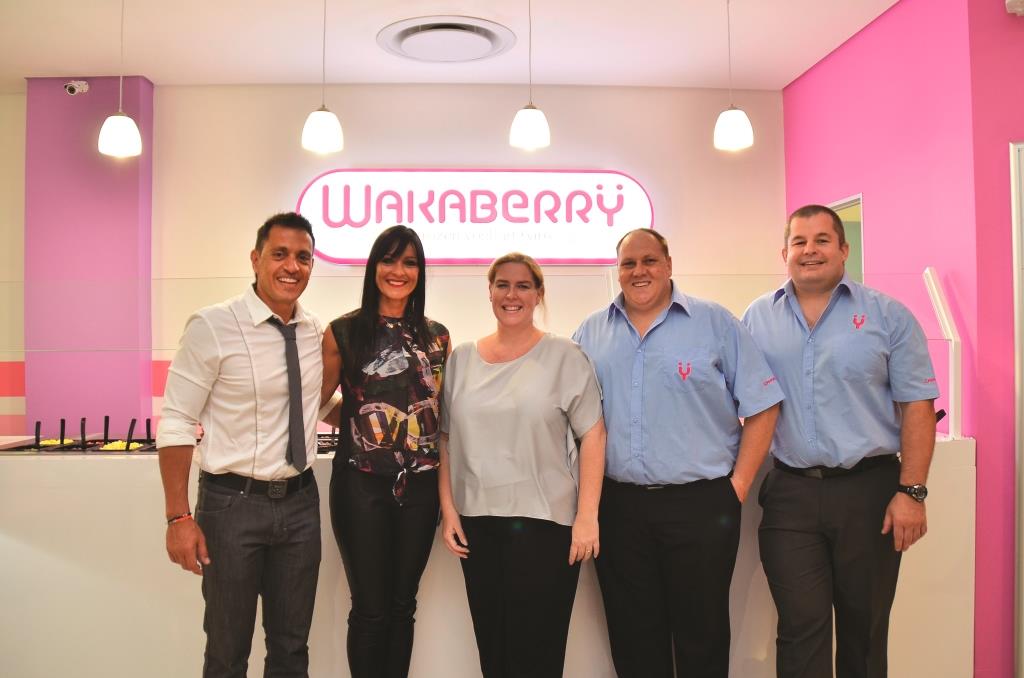It was a name that took less than two years to build. Wakaberry, inspired by the 2010 Soccer World Cup anthem ‘Waka Waka’, with a sales turnover of more than R25 million ($2.8 million) a year from 13 stores around South Africa, with nine more on the way.
The company is the fruit of the labor of the Fouries. Michele studied to be a primary school teacher, while her husband, Ken, played rugby for the Natal Sharks. In 1998, Ken received a professional contract to play for Leicester Tigers and they moved to the United Kingdom. They later relocated to Wales, when Ken was offered a long-term contract with the Cardiff Blues. During that time, Michele completed a Master of Science Degree in Criminology and Criminal Justice. Cardiff became a second home to the Fouries but five years later, when Ken’s contract was up, they decided to move to the United States.

“We traveled to the States a couple of times on holiday and I think that by nature we always like fresh challenges; we’re definitely the type of people that don’t like to sit somewhere forever. So we kind of find new challenges and really liked North Carolina.”
In 2005, the couple moved to Wilmington, North Carolina, where they bought a restaurant, appropriately named Ken’s Bagels.
“That was probably our biggest move in terms of being entrepreneurs—going into a completely unknown field, into an unknown country. And only about three weeks into the actual process of looking for a business to buy did we discover the name of the particular business and I said if that’s not a sign then I don’t know.”
Two years later, after acquiring the business know-how that they needed, they decided to open their own restaurant—Café Brava. It served everything from Rooibos tea to Ouma rusks.
“We’d been open probably about six months with Café Brava and got to know the relatively small South African community in North Carolina and seen again that there was this market for South African products. So we did the research and found a company that does the importing for the big stores in Atlanta and New York and we were able to have a little selection of South African food stuff,” says Michele.
The business did very well but the recession of 2008 was a game changer for the Fouries. Michele admits that it was something she would never want to experience again but as tough as it was, it was a lesson.
“It was very difficult in the States. We’d lived through kind of both sides: the boom of 2007 and 2008, where retail was riding high. It was relatively easy, by the end of 2009, to see businesses that were booming pretty much shut up shop within a two-month period. Having lived through that has made us cautious financially and aware that success of today does not mean success of tomorrow.”
The couple moved back to Durban, after their daughters were born, to be closer to their family. When they arrived, the Fouries contacted their friend David Clark, who owned a shipping business, to oversee transport logistics. They noticed that there was gap in the market in South Africa for frozen yogurt. They had seen how it sold overseas and the three entrepreneurs decided to go into business.
“We were lucky enough, we were able to sell our existing business in the States before we left and we used the funds from that to fund Wakaberry. We self-funded the initial store, set up in Durban, in Florida Road, and have done that since day one. It was never funded through bank loans; it was all our personal money and blood, sweat and tears that had gone into every step of it.”
The franchise works on a self-service, pay-by-weight concept. Mixed berry, kiwi, watermelon, strawberry and vanilla are a few of the yogurt flavors, which can be topped up from the candy bar filled with sweets, chocolates and fruits. However, according to Michele, franchising was never the plan.
“It was really born out of necessity. Florida Road was open for three months and just became so busy that we had to open a second store, which we also owned—the Durban North store. From there, we just were receiving so many queries on a daily basis at our office and from customers that it came out of customer demand.”
For a market as young as this, new legislation can play a huge part in the future of the business. In February, the Department of Agriculture, Forestry and Fisheries published a set of requirements for different types of edible ices, including frozen yogurt, which will be phased in over 12 months. Michele believes that as important as these regulations are, a lot more still has to be done.
“So people that say they have got natural yogurt where it’s made with powder, they will not be allowed to do that anymore. I think it’s a good starting point but I think even the authors of the legislation would agree that there’s still a long way to go in terms of the class of edible items or frozen desserts. Though there are internationally accepted standards in terms of the percentage of the bio cultures and probiotics that have to be present in any dairy to be classified as yogurt. It’s very technical but that is what they’re trying to achieve in the long run of finding a base level of a classification for yogurt.”
For the Fouries, it is merely another obstacle on the road walked by the true entrepreneur.
